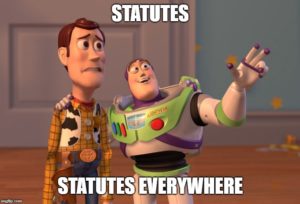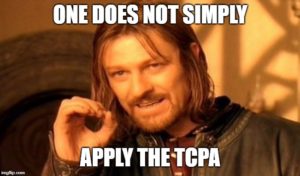This month’s “Headnotes” from the Dallas Bar Association has two items of particular interest — on page 18, information about each of the new “Slate of Eight” Justices on the Fifth Court; and on page 19, an article by me and my LPCH colleague John Volney about the Fifth Court’s recent cases on “trial by consent.”
Monthly Archives: March 2019
 In its third case this term about the effect of contractual disclaimers in commercial disputes, the Texas Supreme Court held:
In its third case this term about the effect of contractual disclaimers in commercial disputes, the Texas Supreme Court held:
‘We have no trouble concluding that the factors generally support a finding that Lufkin effectively disclaimed reliance on IBM’s misrepresentations. The parties negotiated the Statement of Work at arm’s length, they were both knowledgeable in business matters and represented by counsel, and the two clauses expressly and clearly disclaim reliance. But as Lufkin points out, the clauses only disclaim reliance on representations that are “not specified” in the Statement of Work or the Customer Agreement. Relying on two other provisions, Lufkin argues that the misrepresentations on which it based its fraudulent-inducement claim were “specified” in the Statement of Work, and at a minimum, reading those provisions together with the disclaimers’ “not specified” language renders the clauses too ambiguous to be enforceable. We are not convinced.‘
Encompass Office Solutions v. Blue Cross & Blue Shield of Louisiana, No. 17-0666 (Tex. March 15, 2019).
 A complicated tangle of arbitration, court, Texas and New Jersey produced a basic insight about forum-selection litigation: “Webb’s forum concerns highlight practical but all-too common and not-at-all error-establishing issues in modern litigation. He may have to travel further than he would like and may have to work harder to get witnesses properly to the New Jersey courts, but Webb has made insufficient showing on any part of the relevant analysis.” A footnote summarized case authority on this basic point, that all too often gets shunted to the end of a multi-factor analysis in a dispute about the proper forum. Webb v. Diversegy, LLC, No. 05-17-01258-CV (March 13, 2019) (mem. op.)
A complicated tangle of arbitration, court, Texas and New Jersey produced a basic insight about forum-selection litigation: “Webb’s forum concerns highlight practical but all-too common and not-at-all error-establishing issues in modern litigation. He may have to travel further than he would like and may have to work harder to get witnesses properly to the New Jersey courts, but Webb has made insufficient showing on any part of the relevant analysis.” A footnote summarized case authority on this basic point, that all too often gets shunted to the end of a multi-factor analysis in a dispute about the proper forum. Webb v. Diversegy, LLC, No. 05-17-01258-CV (March 13, 2019) (mem. op.)
 John Ellis, a former employee of DART, sued for discrimination and encountered a confoundingly complicated area of governmental-immunity law. The Fifth Court, concluding that “we are bound by controlling supreme court precedent in this area of perplexing legislative enactments,” held: “We cannot conclude in these circumstances that a waiver of governmental immunity is clear and unambiguous, as is required. Like the Norman [supreme court opinion], we view the law as ‘too internally inconsistent’ to meet that standard.” Ellis v. DART, No. 05-18-00521-CV (March 13, 2019).
John Ellis, a former employee of DART, sued for discrimination and encountered a confoundingly complicated area of governmental-immunity law. The Fifth Court, concluding that “we are bound by controlling supreme court precedent in this area of perplexing legislative enactments,” held: “We cannot conclude in these circumstances that a waiver of governmental immunity is clear and unambiguous, as is required. Like the Norman [supreme court opinion], we view the law as ‘too internally inconsistent’ to meet that standard.” Ellis v. DART, No. 05-18-00521-CV (March 13, 2019).
 My LPCH colleague John Adams and I have argued that the Fifth Court’s power to rehear cases en banc is best used for “Goldilocks” cases – issues big enough to be important in other cases, but no so important that the Texas Supreme Court is likely to preempt whatever the
My LPCH colleague John Adams and I have argued that the Fifth Court’s power to rehear cases en banc is best used for “Goldilocks” cases – issues big enough to be important in other cases, but no so important that the Texas Supreme Court is likely to preempt whatever the  Dallas court may do. In that spirit, the 13-0 opinion in Chakrabarty v. Ganguly reversed a longstanding Fifth Court precedent about whether money and stocks were “tangible personal property” within the meaning of the Family Code. No. 05-17-01195-CV (March 7, 2019).
Dallas court may do. In that spirit, the 13-0 opinion in Chakrabarty v. Ganguly reversed a longstanding Fifth Court precedent about whether money and stocks were “tangible personal property” within the meaning of the Family Code. No. 05-17-01195-CV (March 7, 2019).
Dyer v. Medoc Health Services is  a TCPA opinion by Justice Molberg, a prominent member of the newly-elected “Slate of Eight.” It declines to apply the TCPA in a commercial trade-secrets dispute, holding, inter alia:
a TCPA opinion by Justice Molberg, a prominent member of the newly-elected “Slate of Eight.” It declines to apply the TCPA in a commercial trade-secrets dispute, holding, inter alia:
Association. “Because the text messages between Basiti and Dyer were private communications related to an alleged conspiracy between the two men and did not involve public or citizen’s participation, it would be “illogical” to apply the TCPA to those communications”
Speech. “We cannot conclude communications discussing allegedly tortious conduct are tangentially related to a matter of public concern simply because the proprietary and confidential information that was to be misappropriated belonged to a company in
the healthcare industry or because the alleged tortfeasors hoped to profit from their conduct.”
Petition. “However, even assuming Dyer’s actions, and the communications relating to those actions, were “petitioning” activities as defined by the TCPA, appellants failed to establish appellees’ claims were based on, related to, or in response to any communications between Dyer and any other person about the FBI investigation or on Dyer’s providing appellees’ proprietary software and confidential information to the FBI.”
No. 05-18-00472-CV (March 8, 2019). The Texas Supreme Court has assertively advanced a broad reading of the TCPA, including multiple reversals of the Fifth Court; the handling of any petitions for review in this case will be of great interest to the commercial-litigation bar.
 Morben Realty successfully sued Texas Capital Holdings; the trial court denied recover of attorneys’ fees and the Fifth Court reversed, noting: “Texas law has ‘long distinguished attorneys’ fees from damages.’ So does this contract.” Specifically, the section on remedies “generally provides the seller with a liquidated damages remedy if the purchaser defaults” –
Morben Realty successfully sued Texas Capital Holdings; the trial court denied recover of attorneys’ fees and the Fifth Court reversed, noting: “Texas law has ‘long distinguished attorneys’ fees from damages.’ So does this contract.” Specifically, the section on remedies “generally provides the seller with a liquidated damages remedy if the purchaser defaults” –
Seller shall, as Seller’s sole remedy, be entitled to terminate this Contract and receive and retains the Earnest Money deposit as liquidated damages; it being specifically agreed between Seller and Purchaser that Seller’s actual damages in the event of Purchaser’s default would be impossible to ascertain and the Earnest Money Deposit is a reasonable estimate of the same . . . .
But another section addressed the recovery of fees by the prevailing party –
In the event either party to this Contract commences legal action of any kind to enforce the terms and conditions of this Contract, the prevailing party in such litigation shall be entitled to collect from the other party all reasonable costs, expenses, and attorney’s fees incurred in connection with such action.
Morben Realty v. Texas Capital Holdings, No. 05-17-01105-CV (Feb. 27, 2019) (mem. op.)
 Douglas asked Dallas Performance to install a new camshaft in her 2004 Corvette (example, to the right); while doing so, the company also did about $5,000 in additional engine work. Among other holdings, the Fifth Court rejected the company’s quantum meruit claim, observing Douglas’s testimony that she lacked notice of the work or the company’s expectation of her payment for it, and noting that no jury question asked whether her boyfriend was her authorized representative. Douglas v. Sims, No. 05-17-01187-CV (Feb. 26, 2019).
Douglas asked Dallas Performance to install a new camshaft in her 2004 Corvette (example, to the right); while doing so, the company also did about $5,000 in additional engine work. Among other holdings, the Fifth Court rejected the company’s quantum meruit claim, observing Douglas’s testimony that she lacked notice of the work or the company’s expectation of her payment for it, and noting that no jury question asked whether her boyfriend was her authorized representative. Douglas v. Sims, No. 05-17-01187-CV (Feb. 26, 2019).
 The Texas Supreme Court’s recent opinion in Mercedez-Benz v. Carduco holds, in a nutshell, that this clause foreclosed fraud claims based on alleged misrepresentations about exclusive area for a car dealership:
The Texas Supreme Court’s recent opinion in Mercedez-Benz v. Carduco holds, in a nutshell, that this clause foreclosed fraud claims based on alleged misrepresentations about exclusive area for a car dealership:
MBUSA will assign to Dealer a geographic area consisting of a collection of zip codes or census tracts that is called an Area of Influence (“AOI”). MBUSA may alter or adjust Dealer’s AOI at any time. The AOI is a tool used by MBUSA to evaluate Dealer’s performance of its primary obligations hereunder. Dealer agrees that it has no right or interest in any AOI and that MBUSA may add new dealers to or relocate dealers into Dealer’s AOI. Any such addition or relocation of a dealer will result in an alteration or adjustment of Dealer’s AOI.
No. 16-0644 (Tex. Feb. 22, 2019).
 Amcad sued Freightquotes.com about a misplaced delivery. Freightquoutes moved to dismiss, pointing out that the relevant bill of lading incorporated “terms and conditions” on the company website, which in turn contained a Missouri foum-selection clause. Freightquotes lost in the trial cost and lost again before the Fifth Court. The panel majority (Justice Myers, joined by Justice Carlyle) “conclude[d that] the referring language is ambiguous as to who agreed to which Organization’s terms and conditions and does not unambiguously incorporate by reference Freightquote’s terms and conditions,” and thus denied mandamus relief. The dissent (Justice Whitehill) reasoned that “the parties plainly agreed to governing, written terms and conditions residing at a specific and readily accessible website” that plainly encompassed this dispute. No. 05-18-01028-CV (March 1, 2019) (mem. op.) (both opinions, applying Bob Montgomery Chevrolet Inc. v. Dent Zone Cos., 409 S.W.3d 181, 189 (Tex. App.—Dallas 2013, no pet.)).
Amcad sued Freightquotes.com about a misplaced delivery. Freightquoutes moved to dismiss, pointing out that the relevant bill of lading incorporated “terms and conditions” on the company website, which in turn contained a Missouri foum-selection clause. Freightquotes lost in the trial cost and lost again before the Fifth Court. The panel majority (Justice Myers, joined by Justice Carlyle) “conclude[d that] the referring language is ambiguous as to who agreed to which Organization’s terms and conditions and does not unambiguously incorporate by reference Freightquote’s terms and conditions,” and thus denied mandamus relief. The dissent (Justice Whitehill) reasoned that “the parties plainly agreed to governing, written terms and conditions residing at a specific and readily accessible website” that plainly encompassed this dispute. No. 05-18-01028-CV (March 1, 2019) (mem. op.) (both opinions, applying Bob Montgomery Chevrolet Inc. v. Dent Zone Cos., 409 S.W.3d 181, 189 (Tex. App.—Dallas 2013, no pet.)).